A couple of months ago, my co-blogger Beatrice pointed out that lds.org applies handy topic labels to General Conference talks. I thought it might be fun to look through these to see which topics have been addressed most frequently in the last 40 years.
The topic labels are posted with each Conference page. For example, here’s the list for the April 2013 Conference. There are a couple of issues that make these data less than ideal. First, some of the terms used, such as “family history” rather than “genealogy,” suggest that the topic labels weren’t assigned at the same time the Conferences occurred, but were rather assigned years later. Second, the labeling appears to have been done in at least three phases, given dramatic shifts at two points in time in the average number of topic labels per talk. This means at least three different people assigning labels, and it’s unlikely they would agree entirely with one another’s choices. But for purposes of this post, which isn’t all that serious anyway, I’m just going to ignore any issues with the data, throw it all in a big pile, and make a few graphs.
Most popular topics
Here are the top ten topics in order of popularity. The vertical axis in this graph, and in all graphs below, shows how many talks were assigned the topic label since 1971. I think there are no real surprises here. I’m disappointed that obedience comes in at #3, but not surprised.
Seven deadly sins
It looks like lust is the favorite of the seven deadly sins. Of course, there aren’t actually any talks labeled with “lust,” so I chose “morality” as maybe referring to the same thing. In this graph and all others below, when I substituted an alternative term to try to find labels that matched a topic, I’ve put the actual topic word used on lds.org in parentheses.
Books of scripture
Not surprisingly, the Book of Mormon beats the pants off other books of scripture.
Godhead
I guess it’s clear who the favorite member of the Godhead is.
Missions of the Church
It’s tough to pick labels for perfecting the saints. Just about anything could be fit under that heading. So you could certainly argue with my choices there. But it does appear that Conference talks far more frequently address proclaiming the gospel than redeeming the dead.
Necking and petting
So of course we could never have a subject label as blatant as “sex.” That would be gauche! It appears that we also can’t have one as obvious as “chastity.” Here’s my list of vaguely sex-related words that might or might not be euphemisms for sex.
Young women’s values
I wouldn’t have guessed it, but “divine nature” and “individual worth” actually do show up a few times as topic labels for talks. This was actually what prompted me to look at how frequently all the values show up.
Groups of people
I found topic labels that refer to groups by age, groups by marital status, and groups by gender. I’ve added some groups that were never referred in the graph to just to emphasize what is clearly the imagined default person in the Church: married, male, and middle-aged. The unmarked groups don’t get subject labels applied to them. I realize that the topic labels are probably the opinions of just a small number of people, but I think it would signal that women have arrived as being taken seriously as fully members of the Church when they no longer qualify as being a special topic requiring a separate label. The message of this type of label is that there are talks for people in general, who are of course men, and then talks for women, which are a separate class of talks.
After all we can do
Nephi says we are saved by grace “after all we can do.” It looks like Conference talks emphasize all we’re supposed to do a lot more than the grace.
Heavenly Mother always liked you best!
Other Christians give us a hard time for believing Jesus and Satan are brothers. If they are, it’s pretty clear which brother is the favorite. Maybe that’s why Satan rebelled. Older siblings are typically more compliant with their parents’ wishes and younger siblings are the rebels.
Ten Commandments
“Thou shalt not commit adultery” is the Conference favorite, but only if you believe my attempt to connect the euphemism “morality” to adultery. There’s much less discussion of not killing or stealing.
Obedience vs. sacrifice
Samuel famously told Saul that “to obey is better than sacrifice.” It looks like this difference holds up in Conference talk popularity too. Unfortunately, I couldn’t find any mention of Samuel’s next comparison point, hearkening versus the fat of rams, in topic labels. In fact, there weren’t any topic labels referring to animal fats of any kind.
Seven heavenly virtues
We looked at the seven deadly sins, so how about the seven heavenly virtues? Chastity is the favorite, but only because I stuck “morality” in for it again.
And the greatest of these is . . .
Faith? Paul claimed it was charity. What does he know?
Seven habits of highly effective Mormons
While we’re on the lists of seven, let’s throw in Stephen Covey’s famous seven habits. You can see I had to stretch quite a bit to make any of the topic labels match the seven habits. I must admit that I didn’t try all that hard to match “synergize,” a word that I can’t hear without spontaneously rolling my eyes. I’ll just be happy thinking that Conference talks aren’t telling me about synergizing. I do enough eye-rolling while watching it as it is.
Can mercy rob justice?
Alma says no, but it appears that discussion of mercy can at least crowd out discussion of justice.
Is it the attitude or the gratitude?
I’m pretty sure I’ve heard about an attitude of gratitude in Conference several times. Which is more important, though? Clearly it’s the gratitude. Which makes sense if you think about it, I guess. Gratitude with no attitude is still a virtue, but attitude with no gratitude sounds like trouble, as the implication is that the attitude is bad.
Boyd K. Packer’s hit list
President Packer famously labeled feminists, gays, and intellectuals as the three great enemies of the Church. None of them appear to get much discussion in Conference. Of course, this fact really shines a light on the weaknesses of this type of analysis: President Packer routinely condemns gay marriage without saying any explicit words that might lead a label assigner to assign the label “homosexuality” to the talk. Getting back to the graph, tolerance is included because of President Packer’s recent talk in which he mentioned the “tolerance trap.” Finally, President Packer also warned that “Some things that are true are not very useful.” Because he isn’t opposed to truth in general–only the non-useful kind–I added a caveat to the last bar.
In the future I hope to do something a little more substantive with these data, but for now, I hope you enjoyed these mostly frivolous comparisons.

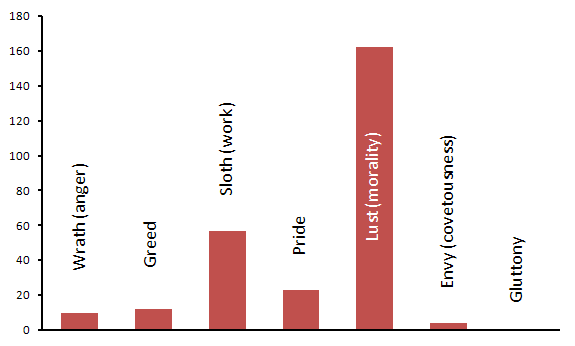
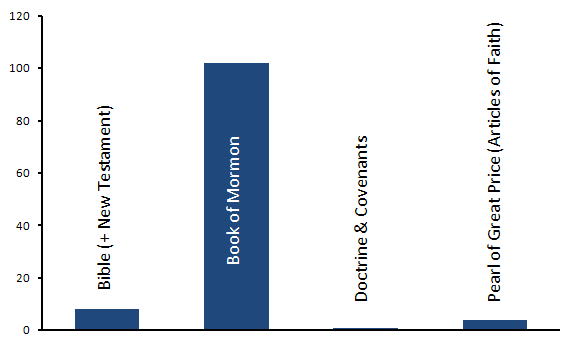
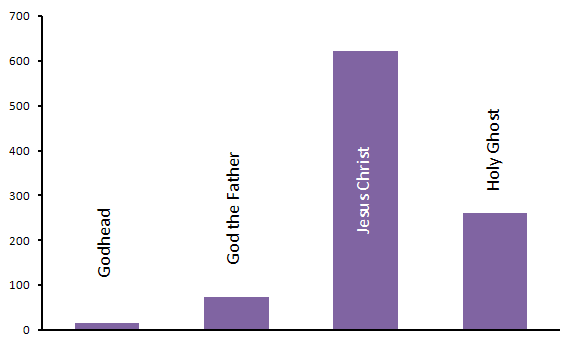
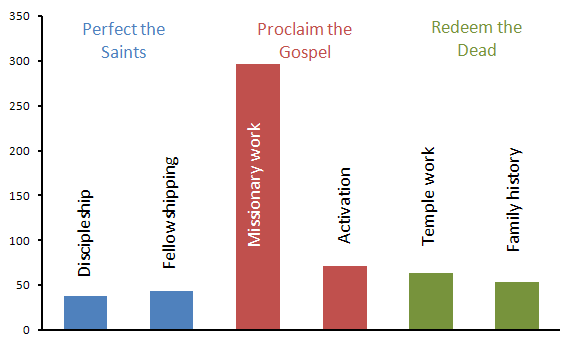
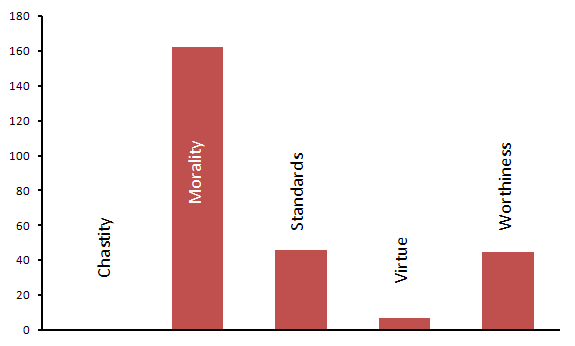
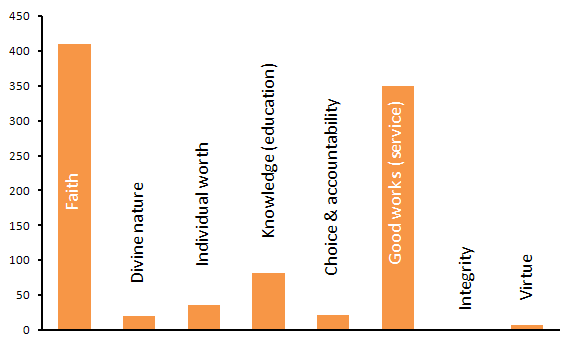
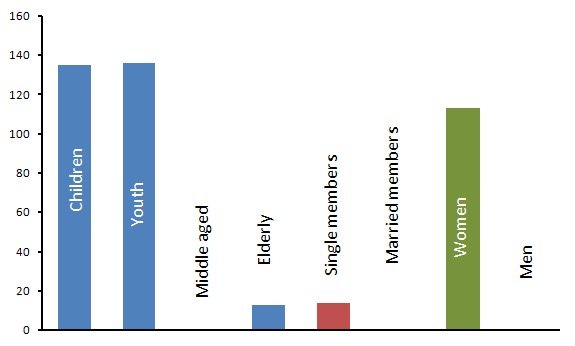
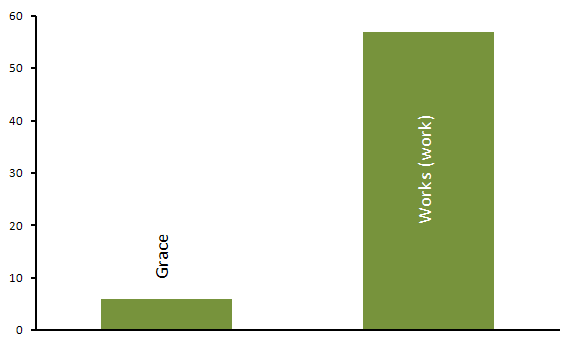

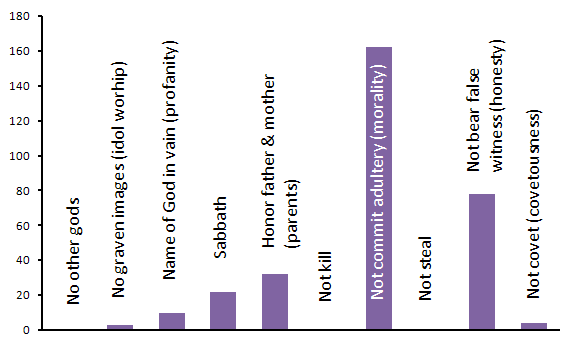
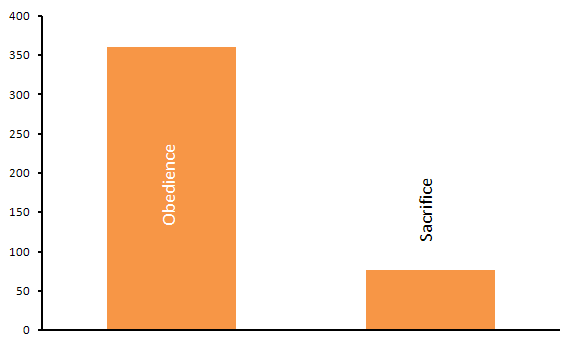
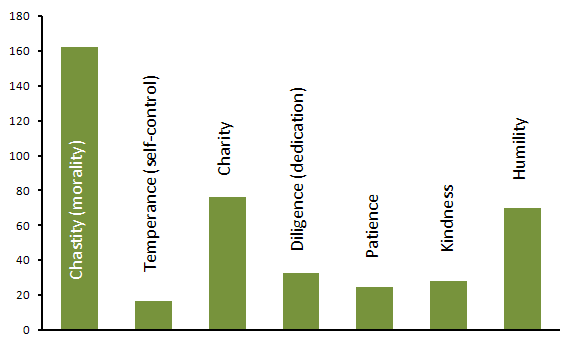
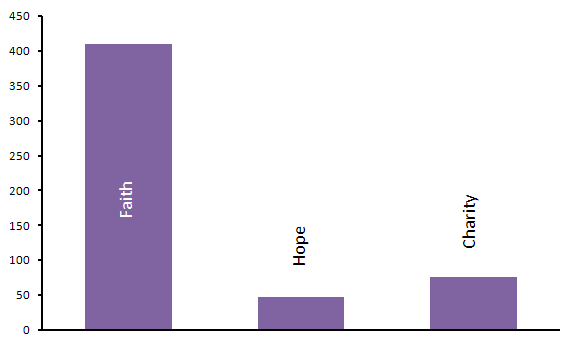
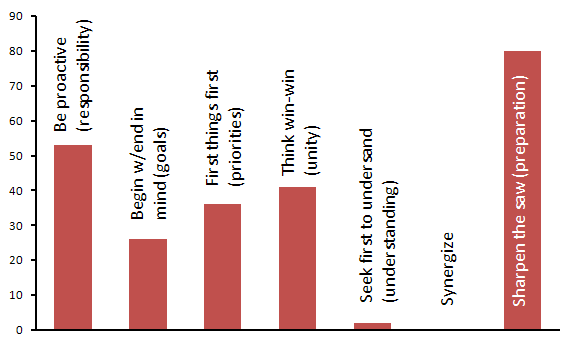
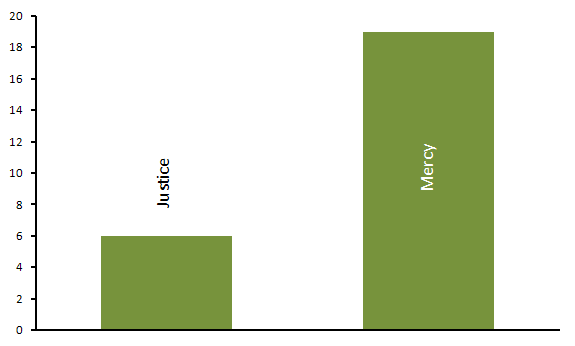

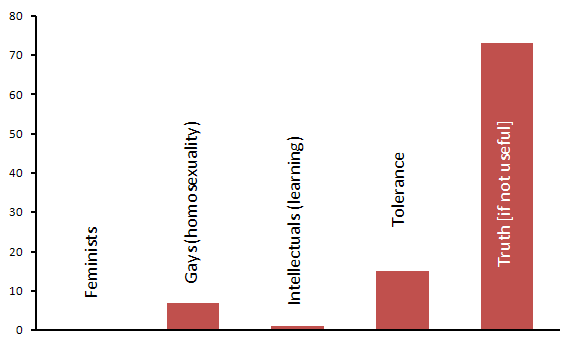
Ziff, why not have honesty stand in for integrity? It’s at least as close as chastity/morality, isn’t it?
Love it! I especially think your graph about groups of people is interesting. While many would argue that women are valued in the church because they are often explicitly addressed, I agree with your point that that actually demonstrates that they are not fully integrated.
I don’t disagree with your using morality as a chastity equivalent, but wouldn’t it be nice if we knew the true meaning of morality?
Great post, as always!
I’m surprised (pleasantly) that Jesus gets so much more air time than the Father in conference talks. At church, I often feel that Jesus gets less discussion than other members of the Godhead.
I’m also surprised that pride is discussed so much less frequently than lust. I would have expected more condemnation of pride. (Maybe it’s because I have a pride problem, so I’m hearing condemnation of it in places where the talk taggers aren’t.)
I’m curious as to why you listed activation under the heading of proclaim the gospel. While I did do a fair bit of it on my mission, I would think that activation would be a better fit under perfect the saints because the people who are being reactivated are already church members and we’re helping them to grow and improve.
Informative *and* entertaining! Thank you.
Loved your graphs, and your wit, as always.
On the people groups thing, I agree that having no marker for “middle-aged men” suggests a default assumption about Church members. But I’d also point out the obvious, that low numbers of references to the single and the elderly doesn’t mean that we’re integrated or anywhere near the default — it means that we’re not even on the radar.
Good news for Mormon gluttons. Pass the fry sauce, and grab me another hot dog while you’re up.
For Mormons, atonement is often used synomously with grace, so I would have added Atonement to the Grace catergory. I know my Christian friends use “grace” all the time in places that I would automatically use “atonement” if talking to Mormons.
Not a single hit for “integrity”!? Sad day.
This is awesome, Ziff! I love it! Just a few thoughts:
I think it’s reassuring that mercy overcomes justice, but sad that works beats grace. I wonder if grace beats mercy–then we’d have a sort of paper, scissors, rock thing going on.
It does seem that morality, i.e., sexual sin (it sees clear this is always the implication), is our favorite sin to talk about, by far. That is so curious to me. Why should it be the case? There are a lot of other awesome sins out there. Maybe it’s just the one everyone wishes they could break more (e.g., it’s more exciting to imagine than selfishness or pride). I wonder if other Christian churches have the same dynamic. Maybe you could analyze the general conference talks of the Community of Christ (do they have them?). Does it have to do with the sexuality issues surrounding polygamy, or is it a more recent occurrence as a backlash against the 60’s sexual revolution? I’d be really curious to see time trends, if there are enough data to do that.
Finally, I find the Groups of People graph just fascinating. It makes the default so obvious, kind of the gorilla in the room that no one even notices.
Anyway, really cool stuff! Thanks for sharing it.
The marked case/unmarked case thing is like a giant neon sign. It couldn’t possibly be more obvious that there are people….. and then there are women. And especially single women.
Thank you for doing these data posts, they’re fabulous!
Thanks for your comments, everyone. Regarding assigning the subject labels differently, you all have made some good points. Olea, you’re right that honesty seems like a great fit for integrity. (Laura, hopefully this will allay your concern a bit.) And jks, that’s a good point that we Mormons maybe talk about “the Atonement” where other Christians would say “grace.” And Trudy, that’s a good point that activation might better be perfecting the saints than proclaiming the gospel. I guess I was just kind of lumping together stuff missionaries do. 🙂
In general, in case this isn’t obvious, I don’t think these topic labels should be taken too seriously, given that they’re assigned by likely a very small number of people who don’t have any particular position in the Church. Also, it’s clear that later topic labels were assigned to match earlier ones, for example with the honesty vs. integrity issue. Whoever assigned the first labels called it honesty, and whoever came along later said, in effect, “Oh, we’re calling that topic honesty? Honesty it is.”
Also, Ardis, great point about singles and older people. I think you’re spot on that women are at least on the radar of Church leaders as people who might need more attention or care or something. But singles, particularly older singles, pretty much don’t exist in Church discourse at the general level.
what, no pornography? overcoming ‘the natural man’? 😉
Wonder how much that coincides with the normalcy of considered audience being middle-aged, married men.
Thanks for an interesting view.
Love this.
Thanks, Ziff, for compiling all of this data! This is very interesting!